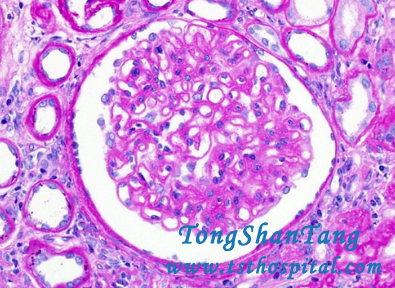 Kidney disease is usually a chronic disease, however, there is a nephropathy, for some reasons, it progresses rapidly. It is rapidly progressive glomerulonephritis, also known as crescent glomerulonephritis. This disease develops quickly and progresses into kidney failure within several weeks or months, presenting oliguria, gross hematuria, massive proteinuria and other typical clinical manifestations. And kidney biopsy shows 50% above glomeruli have crescents to form.
Kidney disease is usually a chronic disease, however, there is a nephropathy, for some reasons, it progresses rapidly. It is rapidly progressive glomerulonephritis, also known as crescent glomerulonephritis. This disease develops quickly and progresses into kidney failure within several weeks or months, presenting oliguria, gross hematuria, massive proteinuria and other typical clinical manifestations. And kidney biopsy shows 50% above glomeruli have crescents to form.
What can cause crescent glomerulonephritis?
Crescent nephritis can occur in any nephropathy, such as IgA nephropathy, lupus nephritis, allergic purpura nephritis, membranous proliferative nephritis, acute post streptococcal glomerulonephritis, etc. And the following conditions can increase the risk of crescent glomerulonephritis.
-Primary glomerulonephritis
-Infections
-Multisystem disease
-Drugs
Classification of crescent glomerulonephritis
Crescent nephritis can be classified into three or five types according to immunopathology.
Type Ⅰis "type of antibasement membrane antibody": most kidneys go dead quickly, and most patients progress into uremia within several months and live on long-term kidney replacement treatment (dialysis or renal transplant);
Type Ⅱis "immune complex type": in the case of timely treatment, some kidneys are still dead, and patients with good curative effect can get rid of dialysis;
Type Ⅲ namely "little immune sedimentary type" : with timely treatment, the therapeutic effect is relatively good, and patients can get rid of dialysis.
From the classification, we can see how important timely treatment for crescent nephritis, crescent nephritis is mostly immune complex nephritis. With timely detection and treatment, you can control the disease; Once the crescents become fibrosis, you can only do dialysis or kidney transplantation. There is no other way.
5 signs of crescent glomerulonephritis
You should pay attention to the following five signs. Once you have them, seek treatment timely.
1. Sudden oliguria or anuria, the urine volume within 24 hours is less than 400ml, or even less than 100-200ml;
2. Serum creatinine increases sharply in the short term;
3. Kidney disease with pulmonary hemorrhage, such as cough, hemoptysis and chest tightness;
4. The primary or secondary glomerular diseases suddenly appear aggravation, such as IgA nephropathy, purpura nephritis and lupus nephritis;
5. Middle-aged and elderly patients not only have nephropathy, but also lung, upper respiratory tract, sinus, ears, eyes, gastrointestinal tract, skin, nervous system or joint and other manifestations besides renal involvement. Related examinations are needed in such a case.
Now you know this crescent glomerulonephritis. If you still have any questions on such a disease, please leave a message below or contact online doctor.
- Email:tsthospital@hotmail.com
- WhatsApp/WeChat/Phone Number:+86 15512139310
- Kidney Treatment Group:
- https://chat.whatsapp.com/2ZCOvebPJdr9QGkyfiqxDz
- Tag: Kidney Failure Kidney Failure Causes
- previous:These Drugs Are Extremely Harmful to the Kidneys
- next:Can Painkillers Cause Kidney Failure

